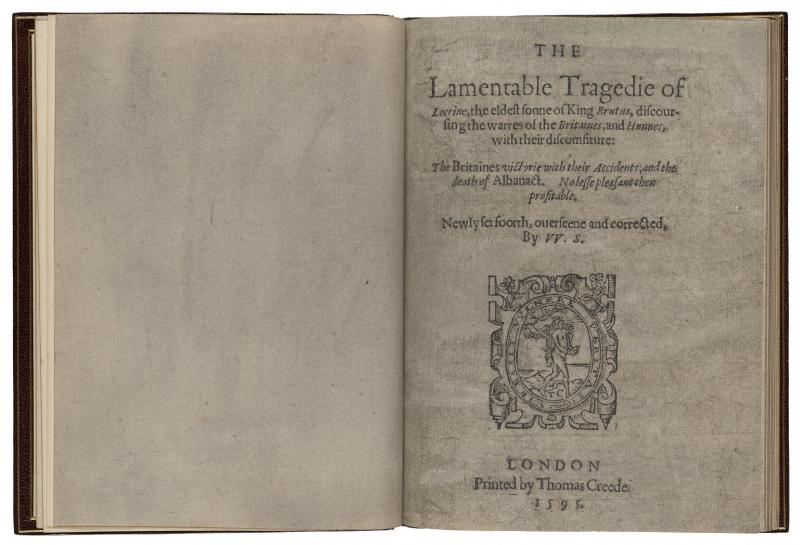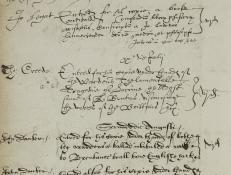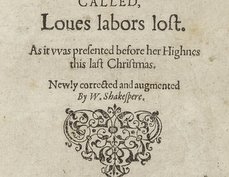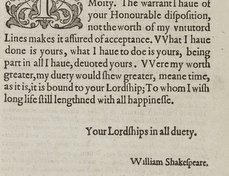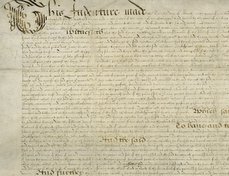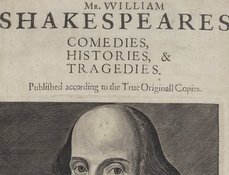Terms of use
Images that are under Folger copyright are licensed under a Creative Commons Attribution-ShareAlike 4.0 International License. This allows you to use our images without additional permission provided that you cite the Folger Shakespeare Library as the source and you license anything you create using the images under the same or equivalent license. For more information, including permissions beyond the scope of this license, see Permissions. The Folger waives permission fees for non-commercial publication by registered non-profits, including university presses, regardless of the license they use. For images copyrighted by an entity other than the Folger, please contact the copyright holder for permission information.
Copy-specific information
Title: The lamentable tragedie of Locrine, the eldest sonne of King Brutus, discoursing the warres of the Britaines, and Hunnes, with their discomfiture: the Britaines victorie with their accidents, and the death of Albanact. No lesse pleasant then profitable. Newly set foorth, ouerseene and corrected, by VV.S.
Date: Printed by Thomas Creede, 1595.
Repository: Folger Shakespeare Library, Washington, DC, USA
Call number and opening: STC 21528 copy 1, title page
View online bibliographic record
Peter Kirwan, "Locrine, first edition," Shakespeare Documented, https://doi.org/10.37078/220.
Folger Shakespeare Library, STC 21528 copy 1. See Shakespeare Documented, https://doi.org/10.37078/220.
Locrine was published by Thomas Creede in 1595 with a title page claiming that the play is “Newly set foorth, overseene and corrected, By W.S.” This Senecan revenge tragedy, with close thematic and plot links to Shakespeare and George Peele’s Titus Andronicus and Robert Greene’s Selimus, is notable for its lengthy dumb-shows and stately speeches.
Several critics, from Baldwin Maxwell (1956) to Lukas Erne (2013, 270), assume that the W.S. must refer to another writer with those initials, and much ink has been spilled on names such as Wentworth Smith for whom no other works survive. Others, including Sonia Massai (2009, 7-8) and Peter Kirwan (2015, 127-38), focusing on the nuances of what may be implied by “Newly set foorth, overseene and corrected,” suggest that these initials may well refer to the first appearance of Shakespeare’s initials in print as a reviser or editor of the play, which is universally agreed to date from some years earlier.
The play was first attributed to Shakespeare explicitly by its inclusion in the 1664 Folio, and it has subsequently appeared in all major editions of spurious plays, including Bate and Rasmussen’s 2013 edition of Collaborative Plays. Attribution scholars have largely sought likeness with one of the university wits such as Greene or Peele, and the presence of shared passages between Locrine and Selimus indicates some form of close relationship between those plays. Peter Berek and Will Sharpe have pursued the possibility that a manuscript note by George Buc on one of the extant copies may suggest the original author was Charles Tilney (Sharpe 2013, 659-60).
Written by Peter Kirwan
Sources
Lukas Erne, Shakespeare as Literary Dramatist, 2nd ed. (Cambridge: Cambridge University Press, 2013).
Peter Kirwan, Shakespeare and the Idea of Apocrypha (Cambridge: Cambridge University Press, 2015).
Sonia Massai, "Shakespeare, Text and Paratext," Shakespeare Survey 62 (2009): 1-11.
Baldwin Maxwell, Studies in the Shakespeare Apocrypha (New York: Greenwood Press, 1956).
Will Sharpe, "Authorship and Attribution," in William Shakespeare and Others: Collaborative Plays, ed. Jonathan Bate and Eric Rasmussen with Jan Sewell and Will Sharpe (Basingstoke: Palgrave Macmillan, 2013): 643-747.
Last updated January 25, 2020

